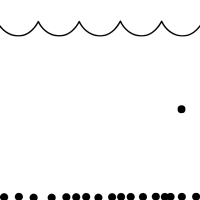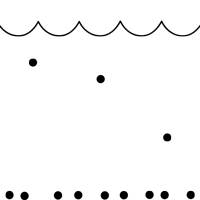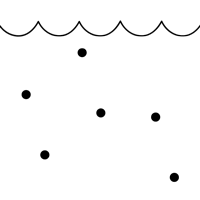LOW
 |
MODERATE
 |
HIGH
 |
Water Solubility
1.800.858.7378npic@oregonstate.edu
We're open from 8:00AM to 12:00PM Pacific Time, Mon-Fri
A to Z
Water Solubility
Water Solubility
Have you ever tried to dissolve sugar in water? It can take a few minutes. Stirring and a little bit of heat can help it dissolve better. Sugar is pretty soluble in water, but there's a limit. If you add too much sugar to the water, you'll see grains at the bottom no matter how long you stir the mixture.
Like sugar and salt, some pesticides are very soluble in water.
- They dissolve easily. Their molecules bond to water molecules.
- Highly soluble pesticides will travel with water as it moves in the environment.
- They can travel downstream and through soil. This increases their probability of reaching groundwater.
- They are more likely to be absorbed by the roots of plants.
- They are not likely to be absorbed into our bodies through the skin.
Much like oil, some pesticides are not very soluble in water.
- They remain separate in the presence of water, even if you try to stir it up. Oily molecules don't bond to water molecules.
- Insoluble pesticides are more likely to stick to soil in the environment. They won't travel as much with water as it moves.
- They are not likely to be absorbed by plant roots, but there are exceptions.
- They are more likely to penetrate the skin, if exposure lasts long enough.
Water solubility is measured in mg/L, the weight of pesticide (in milligrams) that will dissolve in one liter of water (L).
| Low water solubility: | less than 10 mg/L or 10 ppm1 |
| Moderate water solubility: | 10-1,000 mg/L or 10-1,000 ppm1 |
| High water solubility: | more than 1,000 mg/L or 1,000 ppm1 |
1. Ronald Ney, "Fate and Transport of Organic Chemicals in the Environment" 1995; p. 10
Additional Resources:
- Why do some solids dissolve in water? - Purdue University
- Solubility and Factors Affecting Solubility - University of California, Davis
- Solubility - LibreTexts
If you have questions about this, or any pesticide-related topic, please call NPIC at 800-858-7378 (8:00am - 12:00pm PST), or email at npic@ace.orst.edu.
Last updated November 05, 2024
